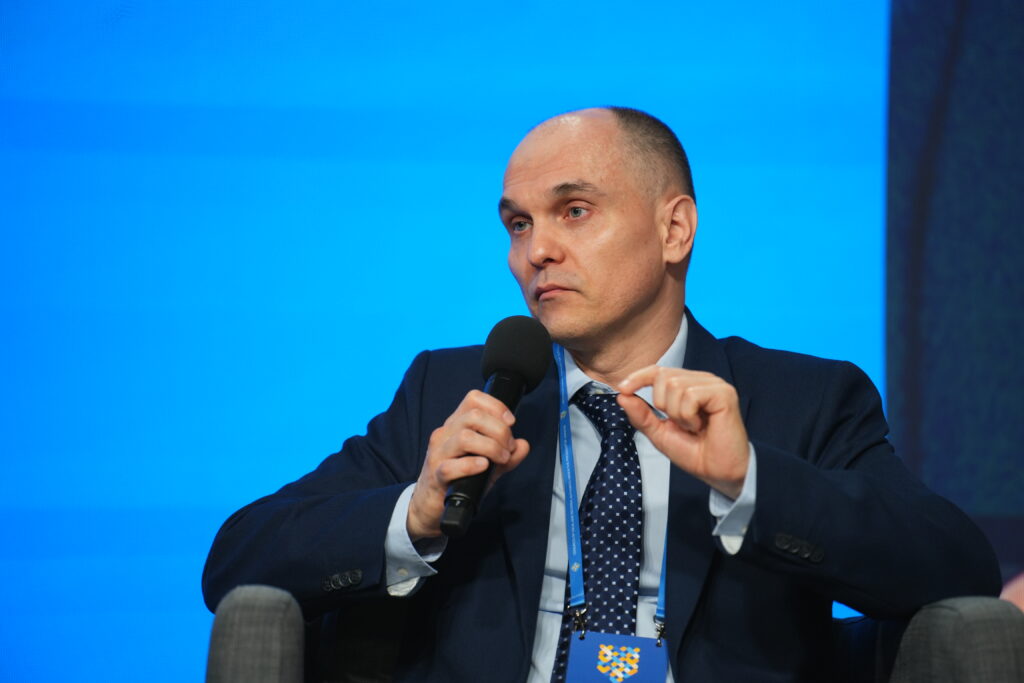
A panel discussion “Internally Displaced Persons: A Humanitarian Challenge” was held in Kyiv during the Second International Summit of Cities and Regions with the participation of President of Ukraine Volodymyr Zelenskyy.
The speakers at the discussion were Iryna Vereshchuk, Vice Prime Minister of Ukraine and Minister for Reintegration of the Temporarily Occupied Territories of Ukraine, Ihor Terekhov, Mayor of Kharkiv, Caroline Lindholm Billing, Representative of the United Nations High Commissioner for Refugees (UNHCR) in Ukraine, Daria Marchak, First Deputy Minister of Social Policy of Ukraine, Alessia Schiavone, Head of the International Organization for Migration in Ukraine, Natalia Zabolotna, First Deputy Head of the Vinnytsia Regional Military Administration, Xerxes Sidhwa, Director of the USAID Office of Humanitarian Assistance, Vitaliy Schmeriga, Senior Project Coordinator at the KfW Ukraine Office, and Carlos Carreiras, Mayor of Cascais (Portugal).
Iryna Vereshchuk drew attention to the fact that the enemy is currently attacking civilian infrastructure rather than military targets. This affects citizens across Ukraine.
“I would like to emphasise a specific figure – 97% of hits by ballistic missiles and other types of weapons occur in civilian infrastructure. This is the whole point of the Russians. They are trying to put pressure on civilians, destroying our energy, trying to disable all supply chains. We have a plan, we are updating it to meet the challenges of today and preparing for the winter season,” the minister stressed.

Carlos Carreiras joined the panel discussion online. During his speech, he noted that the city of Cascais is actively helping Ukraine and called on other foreign cities to join this process.
“I will leave a very important message, in my opinion. I want all European municipalities to be even more involved in helping Ukraine, so that we can provide even more humanitarian support to this country. But, first of all, to help Ukraine, we have to ensure at the EU level that municipalities can help Ukrainian communities directly. As we did with Bucha and Irpin, for example. We need to have simple mechanisms for our successful cooperation,” the mayor stressed.
Kharkiv Mayor Ihor Terekhov said that the city is currently under daily shelling, which results in damage to infrastructure, suffering and deaths.
“Kharkiv is currently facing two challenges: military and civilian. As for the first, the number one task for us is air defence. The President, the Government, the military and, of course, our international partners are working on it. Because our city needs the most modern air defence system, as the distance to the border with Russia is very short. And the civilian challenge is preparing for the heating season and the present. At the moment, due to the hostile attacks that have been going on since 22 March, Kharkiv has no electricity generation of its own. That is why we are well aware that we will not enter the next heating season without the support of our international partners. We already have a plan on how we can prepare the city for the winter together,” said Igor Terekhov.
He also noted that the city is home to 500,000 internally displaced people from Donetsk, Luhansk, Zaporizhzhia, Kherson and Kharkiv regions. Therefore, it is important not only to have the resources

Caroline Lindholm Billing pointed out that UNHCR has so far assisted more than two million Ukrainians for a total of $490 million. The representative of the Office also stressed that these results were achieved thanks to cooperation with the Ukrainian authorities.
“We have statistics on the provision of cash assistance through our distribution centres. In particular, 91% of the people we supported said that cash assistance reduced their financial burden, 82% said it reduced their stress, and 85% said it improved their living conditions. This means that it is an effective way of helping that does not require additional costs. The only way we can improve it is to strengthen our connections and involve businesses in this process,” said Caroline Lindholm Billing.

Daria Marchak pointed out that the Ministry of Social Policy currently values cooperation with international partners, as this allows it to support people throughout Ukraine as much as possible.
“The overall situation is such that we see and constantly analyse the challenges that arise in the face of very limited funding. We use the funds very purposefully. That is why we try to use them very effectively in cooperation with international partners. In addition, it is critically important for us not only to help IDPs, but also to help these people get back on their feet, integrate into communities, work and have living conditions,” said the First Deputy Minister of Social Policy.
The Ministry is currently reforming the housing assistance for internally displaced persons. In particular, a draft resolution has been developed to take into account the cost of housing in the regions. Social nanny services and support and care for people with disabilities are also being improved.

Alessia Schiavone pointed out that the international community and donors are currently paying attention to several aspects of cooperation with Ukraine. These are needs, results, and transparency and accountability.
“As for the first, requests should be based on evidence. We need to listen to communities about their needs and decide at the international level what kind of assistance to provide. It is important to demonstrate the results. Because when we talk about them, we have to use data from two perspectives: clear figures and reports, as well as people’s stories about how donor assistance has changed their lives. The third is transparency and accountability. We need to introduce measures that can be assessed and seen to hold all actors accountable,” IOM’s representative stressed.

Natalia Zabolotna spoke about her experience of working with internally displaced persons in Vinnytsia region. According to her, the region has so far received 20 evacuation trains with only people with limited mobility. This became possible thanks to cooperation with international partners. In particular, donors are helping to create places for people in social and healthcare institutions.
The first deputy head of Vinnytsia Regional Military Administration stressed that such results were achieved through ongoing dialogue with international partners and cooperation with the Government.

Xerxes Sidhwa noted that assistance to Ukraine is important now and will continue to be so. However, he said, it is now necessary to ensure the sustainability of humanitarian funding.
“A few weeks ago, I was told: ‘Unfortunately, what is happening in Ukraine is the normalisation of the situation’. So we have to figure out how to explain to international donors that this is not normal. It should not be like this. That is why the leaders of the countries should advocate for increased funding. Secondly, if there is no additional funding, how to use the existing funding. We, as international partners, must see the needs of communities and understand how we can help. There should be a priority here. Because even in IDP issues, there are different groups: people with disabilities, people with limited mobility, families with children, etc.”, said the USAID representative.

Vitaliy Shmeriga noted that active cooperation between Ukraine and KfW is currently underway. Several housing programmes are already in place, implemented jointly with the Ministry of Reintegration. In particular, they provide for the possibility of renting housing, lease with the possibility of further purchase, as well as providing IDPs with social housing.


